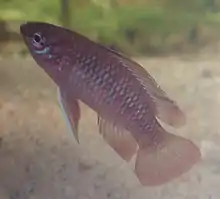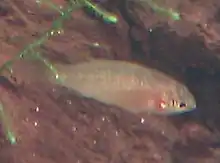Scarlet badis
The scarlet badis (Dario dario) is a tropical freshwater fish and one of the smallest known percoid fish species.[2][3] It is a micropredator, feeding on small aquatic crustaceans, worms, insect larvae and other zooplankton. It is sold under a variety of names (Badis badis bengalensis, B. bengalensis) in the aquarium trade.
| Scarlet badis | |
|---|---|
 | |
| Dario dario male | |
| Scientific classification | |
| Domain: | Eukaryota |
| Kingdom: | Animalia |
| Phylum: | Chordata |
| Class: | Actinopterygii |
| Family: | Badidae |
| Genus: | Dario |
| Species: | D. dario |
| Binomial name | |
| Dario dario (F. Hamilton, 1822) | |
| Synonyms | |
| |
Description

Scarlet badis are among the smallest percoid fish species. Males usually do not exceed 2 cm (0.79 in), with the females being even smaller around 1.3 cm (0.51 in). Apart from the size difference, the sexes are easy to distinguish by the vibrant colors and prominent fins of the male.
Distribution and habitat
The distribution of this species appears to be restricted to tributary systems draining into the Brahmaputra River in parts of West Bengal and Assam states of India, although it might also range into Bhutan. It typically inhabits shallow, clear water streams with sand or gravel substrates and dense growths of marginal and/or aquatic vegetation.
Care in the aquarium
The scarlet badis is becoming increasingly popular as an aquarium fish, particularly in nano aquaria. Their territorial nature does however mean that their environment must contain sufficient boundaries to prevent aggressive behaviour, especially between males of the species. The careful aquarist would ensure that the tank is sufficiently filled with items of decoration capable of breaking up lines of sight and establishing territories. Natural driftwood or coconut shells used as caves are all ideal.[4]
This species should only be considered for inclusion in an established and well-cycled aquarium with suitable water parameters.[4]
Lending to its nature as a predator, small frozen or live foods such as blood worms or brine shrimp are preferred over processed foods such as pellets or flakes.
References
- Britz, R.; Chaudhry, S. (2010). "Dario dario". IUCN Red List of Threatened Species. 2010: e.T168542A71506120. doi:10.2305/IUCN.UK.2010-4.RLTS.T168542A71506120.en. Retrieved 20 November 2021.
- Froese, Rainer; Pauly, Daniel (eds.) (2019). "Dario dario" in FishBase. August 2019 version.
- "Dario dario – Scarlet Badis (Badis dario, Badis badis bengalensis) — Seriously Fish". Retrieved 16 December 2022.
- "aquariumsandfishes.com". ww38.aquariumsandfishes.com. Retrieved 16 December 2022.
External links
 Media related to Dario dario at Wikimedia Commons
Media related to Dario dario at Wikimedia Commons
